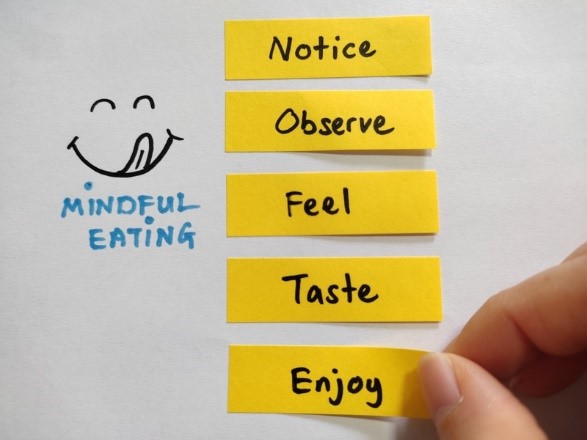Mindfulness is a term you may hear often these days, and it refers to being consciously aware of a particular focus. You can be mindful about almost anything, from your breathing and emotions to the ways you listen or communicate, or even the way you practice gratitude. Mindfulness can also apply to eating. Mindful eating encourages us to slow down and be aware of how and why we eat. It focuses on our awareness of the food we are eating and the overall experience of eating it. Unlike diets that restrict calories and types of food, mindful eating is simply about tuning in to how we feel while eating. It is not about losing weight or dieting, but many people who practice mindful eating end up losing weight as a result. It is an individual experience and reflects your unique sensory perceptions and feelings surrounding the food you are consuming.
Mindful eating is about the process of eating, rather than the results of that eating. Most diets control the timing of when you eat, the types of foods you eat and the number of calories you are consuming. Mindful eating does not include these restrictions and is about your reaction to the foods you choose to eat, your enjoyment of them and your focus on the experience. Being mindful about eating includes your first bite of food until your last and encourages you to notice how each bite, and all the bites in between, makes you feel.
Listed below are several ways to start incorporating the practice of mindful eating into your daily routine:
- Eat slowly. Take time to eat and enjoy each bite. Savor the flavor of each bite and notice how each mouthful makes you feel. Placing your fork down between bites can be an active way to practice this.
- No distractions. Don’t eat while driving, on your cell phone or watching TV. Instead, focus on what you are eating and your dining experience.
- Notice your food. What color is it? What texture does it have? Does the flavor remind you of any other foods you have eaten? Pay attention to your meal.
- Distinguish between being hungry and wanting to eat. It is easy to eat for reasons other than hunger, like boredom or emotional distress. Learn to recognize the difference between actual hunger and just wanting the immediate satisfaction of eating.
- Practice portion control. Many times, we eat everything on our plate without realizing we are full. Use a smaller plate. Smaller portions eaten mindfully may fill you up and make you feel better than a larger portion eaten without thought.
- Don’t skip meals. Skipping meals leads to snacking or binge eating, and often the foods you choose when you are super hungry aren’t the healthiest options.
- Eat healthy options. Appreciating that your food is nutritious and healthy will encourage you to keep up the good work. On a larger scale, think about where your food comes from, how it is grown and its effects on the environment and the planet.
Concentrating on what you put in your mouth can have positive benefits for your overall health. Use your senses to focus on the foods you eat. Mindful eating can change the way you think about food and lead to better eating patterns and habits.
By: Caitlin Kemmerer


Most Commented